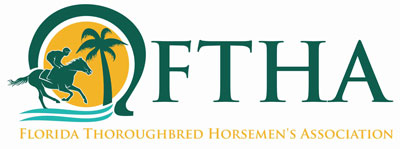
It was enough to give even the most experienced horseman a bad case of heartburn.
Reckoning day was April 21, 2015 in Tallahassee as the Florida House of Representatives’ powerful Finance and Tax Committee called roll to prepare for a debate on “decoupling,” with a specific amendment on decoupling horse racing taking dead aim on HB 1233, a massive overhaul of the state policy that could substantially expand Florida’s gambling landscape if enacted.
Florida Horsemen’s Benevolent and Protective Association (FHBPA) President and Calder Hall of Fame veteran Thoroughbred trainer Bill White straightened his tie, squared his shoulders and walked in.
A pantheon of casino industry lobbyists packed the committee room as White took his place at the front, shoulder to shoulder with his somber colleagues from the Florida Quarter Horse Racing Association (FQHRA), Florida Thoroughbred Breeders’ and Owners Association (FTBOA) and Standardbred interests. Together, they faced a gallery of legislators preparing to decide on the amendment to “decouple” horse racing from other forms of gambling in Florida. The fate of horsemen–the trainers, owners and breeders who drive the lucrative horse racing business in the Sunshine State–hung in the balance.
“The State of Florida’s interest in gambling is to generate tax revenue, not to create the most profitable environment for gaming operations,” FTBOA General Counsel Warren Husband explained to legislators. With 25,000 horses annually engaged in the business of Florida racing or breeding, the biggest economic impact is gained through ensuring adequate racing days, he added.
But in an age of “less government,” the concept of “decoupling” has become the rallying cry of casino operators seeking to rid themselves of horse racing altogether. As White listened to their impassioned arguments calling for “fairness” and “leveling the playing field” by leaving it up to pari-mutuel permitholders as to whether to conduct live racing or not, he wondered if legislators were aware of the many livelihoods and small businesses at stake.
He thought of the many faces of FHBPA members who were even now working on the backstretch as he jotted notes to himself far away in Tallahassee, readying himself for the trial by fire at hand. Just one month into his new role as FHBPA President, the frustration of hearing horse racing trivialized over and over again as unremarkable collateral damage by those who may have never even seen a racetrack welled up in him as he strode to the podium when he was finally called to speak.
Right off the bat, White set the record straight on who the 6,000 FHBPA members are. “We are the real deal as far as the horse owners who put up the money and the trainers’ small businesses who do the work,” he established.
The actual leveling of the playing field, was done by voters, who approved slots in 2004 to ensure that Florida horse racing could continue to compete with northern tracks already flush with casino money that was luring the best horsemen away from the state, he explained. Stand-alone casinos were never the intent.
“Slots are here in Florida because of horse racing,” FQHRA Executive Director Steve Fisch said during his testimony. “(Slots were) not a plan to race a few years, drop racing and then just have slots . . . a fair deal is a two-way street.”
Delivering a powerful punch to casino-only interests in his closing, White called out their presumptuousness in assuming the Florida Legislature would simply cave to special interests and ignore horsemen’s needs.
“Right now, whether you know it or not–even before decoupling might happen, Churchill Downs is tearing down the barns at Calder in anticipation that it will happen. Horses have been displaced and even put in tents. It’s been a real hardship.” White fired his parting salvo: ” . . . as a horseman who has invested my life in this game, I find this action insulting that an entity would take it upon themselves to do this before the Legislature has even acted.”
The horsemen’s strong unified presence paid off with the defeat of the horse racing decoupling amendment. And although the greyhound-related decoupling provisions of HB 1233 passed that day, the clock ran out as the 2015 Legislative Session came to a contentious close just over a week later.
“We still have plenty of work to do,” he reminded FHBPA Board members as he gave his report upon coming back home to South Florida. “I am urging horsemen to take all necessary steps to make your presence known to your Senators and State Representatives. Your involvement is crucial.”
With the call of a Special Session anticipated this week for legislators to pass a state budget after they were unable to do so during the regularly scheduled Session, the general consensus is that gaming issues will likely not be on the agenda. However, horsemen are urged to stay vigilant in the event that HB 1233 surfaces during the anticipated June 1 through June 20 Special Session time period.
To view the entire hearing, click HERE. White’s testimony begins at minute mark 30:20.



